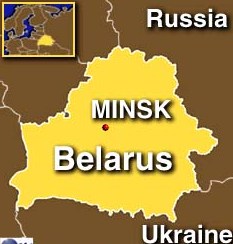ROUNDUP: Thousands march against government in Belarus
 Minsk - Thousands marched against Belarus' authoritarian regime on Wednesday, as opposition groups held rare public gatherings throughout the former Soviet republic.
Minsk - Thousands marched against Belarus' authoritarian regime on Wednesday, as opposition groups held rare public gatherings throughout the former Soviet republic.
More than 4,000 demonstrators gathered in the capital Minsk, some carrying the flag of the European Union, banners proclaiming "Independence!" and the banned red-white-red flag of 1918 Belarus.
The marches came on a semi-official Belarusian holiday known as Will Day that marks the short-lived independent Belarusian republic formed in 1918, and destroyed by invading Soviet troops months later.
Minsk authorities had approved a march in Banglore Square, well away from the city centre.
But the demonstrators, according to witnesses mostly students from Minsk high schools or universities, gathered near the national Academy of Sciences, only a few hundred metres from the residence of Belarus' authoritarian President Aleksander Lukashenko.
Marchers carrying road flares formed a live chain more than a kilometre long shortly after sunset, lighting up Minsk's main central thoroughfare Prospekt Nezavisimosti.
A few demonstrators were seen by a German Press Agency dpa reporter setting fire to portraits of Lukashenko - a crime in Belarus.
Police on the scene confiscated demonstrators' loudspeakers and barred their movement towards government buildings, but by early evening had made no move to break up the crowd.
An intense effort by Belarus' KGB was reported in progress across the city, with agents standing by the residences of opposition leaders, placing them under effective house arrest.
Plainclothes KGB agents met a train arriving in the Belarusian capital Minsk from Moscow and initially detained three members of the Russian pro-democracy Oborony (Defence) youth group.
They later charged two of the activists, Obrony leader Oleg Kozlovsky and associate Aleksander Savelev, and put them on a return train to the Russian capital, said Oborony spokesman Andrei Kim.
Police reportedly charged the pair with "swearing in public." A third activist, Maksim Talykov, also a Russian national, was arrested and taken into custody, Kim said.
Opposition groups held meetings in 25 Belarusian cities, with events to mark Will Day including talks with writers and poets, a public display of 1918-era Belarusian national emblems, information hand-outs, and discussions in the Belarussian language.
"Our goal is to get our message out to a larger number of our fellow citizens, than is normally possible," one of the organizers said, according to a Belapan news agency report.
The turnout was nonetheless thin, with as few as a dozen activists turning out in some provincial cities, and less than 100 in the capital Minsk.
Police were reportedly present at all the gatherings, but in general did not interfere. Law enforcers in the northern city Vitiebsk confiscated opposition brochures, arrested three men carrying the 1918 Belarusian flags, and declared Will Day ceremonies cancelled siting public security concerns.
Opponents of Lukashenko's regime have for more than a decade used the March 25 anniversary date as a pretext to gather in public and discuss possible democratic changes in the government.
Belarusian opposition leader Aleksander Milinkevich told journalists in Minsk, "We can interpret this day in different ways, but we must agree on the most important thing, to get Lukashenko out of power by whatever means possible."
Lukashenko's government, citing a need to preserve stability usually represses public suggestions of change, but allows the Will Day gatherings as it supports Belarusian independence from other states. (dpa)